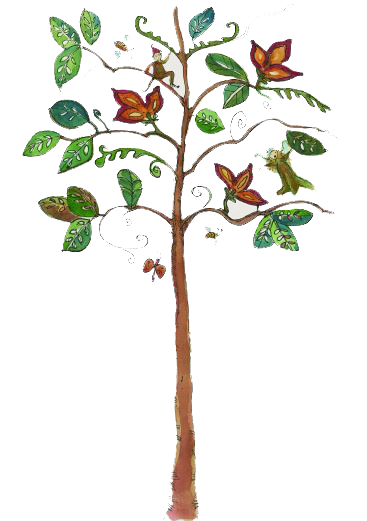About Taraleigh
Our kindergarten and playgroup has been established since 1987. It was formerly the Carnegie Rudolf Steiner Pre-School, which operated in Carnegie. It has developed a strong reputation for being child centred, nurturing and encouraging parent participation. The program and the environment promote the child's natural development through play and exploration. Our program is based on the indications and teachings of Rudolf Steiner.
The kindergarten and playgroup provides a range of enriching experiences for both children and parents and serves as an introduction to Steiner education methods for interested families. Its focus, however, is on the development of the child, and in particular the development of important skills and understandings of the world around them.
The kindergarten is the bridge between home and school, and uses the model of family life as the underlying element of the program, enhanced by movement, learning simple life skills including self care, social learning and artistic pursuits. There is a home like atmosphere in that food is prepared and cooked and the garden is tended. Within this warm and secure environment, the children play freely according to their developmental stage, helping with these tasks when they wish to, or when it is appropriate.
About Steiner Education
The Steiner philosophy on education for the child from birth to seven years old aims to ensure that the child is nurtured physically, emotionally and spiritually. Free, creative play is considered the best preparation for self-realising adult life. The Steiner kindergarten strives to provide guidance for the young child in an environment where children are free to play and free to be children. The Steiner educator endeavours to create an environment that gives children time to play, encouraging them to develop their imagination where they learn to express ideas from within themselves.
A rich supply of open ended, natural materials provides scope for imagination in play. Children learn to enjoy building, using the natural materials in the room and outdoors to make their own constructions and patterns. At this age, children are discovering how to relate socially with a peer group and take part in fundamental life tasks. They are not ready for more formal classes. For those aged four to six years, play is the "work" of the child. Great care is therefore taken to create a protected play space where the child learns by doing. Simple, homely tasks and artistic activities to both do and see are balanced with story telling, singing games and generous play times.
Because the young child lives very much in their will, they like to be doing and moving. At times, outdoor activities predominate - climbing, swinging, rolling, running, balance play, building, mud brick making, watering plants, raking, digging, waterplay in the sandpit. During quieter times, children need the space and time to watch the clouds, observe the bees on the dandelions, or cut pretty flowers for a vase that will be placed on the morning tea table. These daily experiences together with watercolour painting, singing, beeswax modelling, woolcraft and handling natural materials gently develop the children’s senses. At first the children may overwork their paintings, but gradually more care is taken and increasing satisfaction gained in applying colours to the paper.
The young child is also nurtured by daily rhythms of play and imitating adults working at simple tasks around them. There is daily nourishment in the form of simple nature stories, indigenous stories and fairy tales and from rhythmic circle games, finger plays and songs. Seasonal rhythms are also followed, with an end of term celebration and a festival or event to celebrate the changing season.
Adults are a presence in the kindergarten, but leave children free to "meet" each other. In this "meeting" and playing creatively together, children learn vital interpersonal skills. The kindergarten teacher plays an important role in this, enabling relationships between children to strengthen through play.

